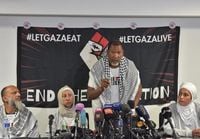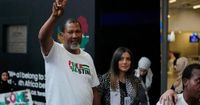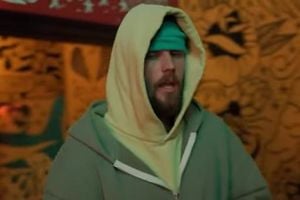Six South African activists who were detained by Israeli authorities after participating in the Gaza Freedom Flotilla have returned home, drawing international attention to both their treatment in Israeli custody and the wider conflict over Israel’s blockade of Gaza. Their ordeal, which unfolded over the past week, has ignited protests across Europe and renewed scrutiny of Israel’s policies in the region, as well as South Africa’s ongoing legal battle against Israel at the International Court of Justice (ICJ).
The flotilla, known as the Global Sumud Flotilla, consisted of 42 boats and some 450 activists from around the globe. Its mission: to challenge Israel’s longstanding naval blockade of Gaza and deliver desperately needed humanitarian aid to the besieged territory. Among those on board was Nkosi Zwelivelile “Mandla” Mandela, a former South African lawmaker and the grandson of anti-apartheid icon and first Black South African president, Nelson Mandela. According to The Associated Press, Mandela and his compatriots were detained when Israeli forces intercepted the flotilla in international waters.
South Africa’s Department of International Relations and Cooperation (DIRCO) was formally notified by Israeli authorities regarding the status of the detained citizens. In an official statement, DIRCO confirmed, “We have received confirmation that the individuals in question are scheduled to be released from detention and will be repatriated, departing via Jordan tomorrow morning.” The activists were freed on October 9, 2025, and deported to Jordan before making their way back to South Africa.
Upon their return, the activists detailed harrowing accounts of their treatment while in Israeli custody—accounts that have sparked outrage both at home and abroad. Mandla Mandela was unequivocal in his assessment of the situation, stating, “Their treatment was because we are a nation that dared through our government to take apartheid Israel to the International Court of Justice and the International Criminal Court and hold them accountable.” He asserted that the group was “harshly dealt with” because of South Africa’s legal actions against Israel over alleged genocide in Gaza.
South African activists Fatima Hendricks and Zaheera Soomar provided particularly disturbing testimony. Speaking to reporters at Johannesburg’s OR Tambo International Airport, Soomar recounted, “Both of us were forced behind a screen, our heads pushed against the wall and completely stripped naked in front of Israeli soldiers. This did not happen to other women. When they saw our passports, this is how we were treated as South Africans.” Hendricks added that their hijabs were forcibly removed, a violation that, according to them, was not inflicted on other Muslim female detainees.
The Israeli Foreign Ministry has vehemently denied any claims of mistreatment. Officials insisted that all activists were offered the opportunity to be voluntarily deported without detention. Israel has consistently rejected allegations of abuse, with the Foreign Ministry labeling similar claims by other activists as “brazen lies.” Swedish environmental activist Greta Thunberg, who was also among those arrested, made comparable accusations, which Israel similarly dismissed.
The episode has not only heightened tensions between South Africa and Israel but has also galvanized global protest. Demonstrations erupted in countries such as Spain, Italy, France, Romania, and the Netherlands, with thousands demanding an end to the blockade on Gaza and the immediate release of those detained. The wave of solidarity comes amid South Africa’s intensified diplomatic and legal efforts to hold Israel accountable for its actions in Gaza.
South Africa’s case at the ICJ, filed in December 2023, accuses Israel of violating the 1948 Convention on the Prevention and Punishment of the Crime of Genocide through its military campaign and blockade of Gaza. This highly contentious case has drawn support from several nations, including Nicaragua, Palestine, Turkey, Spain, Mexico, Libya, and Colombia. Israel, for its part, has rejected the genocide allegations as “outrageous” and has accused South Africa of acting as Hamas’ “legal arm.”
Minister of Justice and Correctional Services Ronald Lamola expressed gratitude for the “cooperation and coordination, both domestically and internationally, that ensured the safe return of our citizens.” The South African government reiterated its commitment to protecting its nationals abroad and reaffirmed its solidarity with the Palestinian people.
The flotilla’s interception and the subsequent detention of activists have once again brought global attention to the humanitarian crisis in Gaza. The territory, home to over two million people, has been under a strict Israeli blockade since 2007—a policy Israel says is necessary for security, but which critics and humanitarian organizations argue constitutes collective punishment. The blockade has severely restricted the movement of people and goods, contributing to dire shortages of food, medicine, and other essentials. The flotilla’s organizers hoped to break the blockade, even if only symbolically, and deliver aid to those most in need.
Mandela’s involvement has added a layer of historical resonance to the episode. South Africa has long been a vocal supporter of the Palestinian cause, drawing parallels between Israel’s treatment of Palestinians and the apartheid policies once enforced in South Africa. Nelson Mandela himself famously stated, “Our freedom is incomplete without the freedom of the Palestinians.” Israel, however, has consistently rejected comparisons to apartheid and maintains that its policies are driven by security concerns.
The controversy has also reignited debate within South Africa about the boundaries of political activism. Mandla Mandela has faced criticism at home and abroad for his alleged support of Hamas and was denied a visa to the United Kingdom in 2024. Nevertheless, his advocacy has kept the spotlight on the plight of Palestinians and South Africa’s role on the international stage.
The situation remains fraught. The Israeli military intercepted another flotilla early on October 8, 2025, detaining more activists and further escalating tensions. As legal and diplomatic battles play out in international courts, the voices of the six South African activists—echoing those of many others—have underscored the human cost of the conflict and the deep divisions it continues to sow worldwide.
For now, the safe return of the activists marks a small victory for South Africa’s government and for those advocating for the rights of Palestinians. Yet, the underlying disputes—over humanitarian access, international law, and the future of Gaza—remain as contentious and unresolved as ever.





